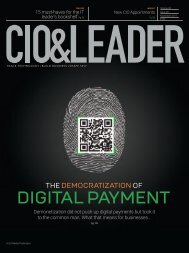white_paper_on_data_protection_in_india_171127_final_v2
Create successful ePaper yourself
Turn your PDF publications into a flip-book with our unique Google optimized e-Paper software.
The relati<strong>on</strong>ship need not be as straightforward <strong>in</strong> all cases. For <strong>in</strong>stance, <strong>in</strong>formati<strong>on</strong> that a<br />
child is born with foetal alcohol syndrome is pers<strong>on</strong>al <strong>in</strong>formati<strong>on</strong> both about the child and its<br />
mother. 223<br />
To signify this relati<strong>on</strong>ship, various c<strong>on</strong>nectors are used. The SPDI Rules use the phrase with<br />
“<strong>in</strong>formati<strong>on</strong> that relates to a natural pers<strong>on</strong>‖. The EU GDPR uses a similar phrase ―any<br />
<strong>in</strong>formati<strong>on</strong> relat<strong>in</strong>g to an identified or identifiable natural pers<strong>on</strong>.‖ The (Australian) Privacy<br />
Act uses the simpler phrase ―<strong>in</strong>formati<strong>on</strong> about an <strong>in</strong>dividual.”<br />
(iii) Identified or Identifiable Individual<br />
All <strong>in</strong>formati<strong>on</strong> about an <strong>in</strong>dividual is not pers<strong>on</strong>al <strong>data</strong>. As stated earlier, protecti<strong>on</strong> of<br />
identity is central to <strong>in</strong>formati<strong>on</strong>al privacy. So the <strong>in</strong>formati<strong>on</strong> must be such that the<br />
<strong>in</strong>dividual is either identified or identifiable from such <strong>in</strong>formati<strong>on</strong>. In statutes or <strong>in</strong>struments<br />
which use both these terms ―identified or identifiable‖ such as the EU GDPR, it refers to<br />
states <strong>in</strong> which the <strong>data</strong> could be. Data could be <strong>in</strong> a form where <strong>in</strong>dividuals stand identified<br />
or <strong>in</strong> other cases, it is possible that they could be identified. 224 Whether an <strong>in</strong>dividual is<br />
identifiable or not is a questi<strong>on</strong> of c<strong>on</strong>text and circumstances. For <strong>in</strong>stance, a car registrati<strong>on</strong><br />
number, by itself, does not reveal the identity of a pers<strong>on</strong>. However, it is possible that with<br />
other <strong>in</strong>formati<strong>on</strong>, an <strong>in</strong>dividual can be identified from this <strong>in</strong>formati<strong>on</strong>.<br />
The questi<strong>on</strong> of identifiability be<strong>in</strong>g <strong>on</strong>e of c<strong>on</strong>text, it is essential to prescribe standards by<br />
which <strong>data</strong> can be said to be identifiable or not. The EU GDPR does not prescribe the<br />
standard <strong>in</strong> the text of the provisi<strong>on</strong>. However, Recital 26 of the EU GDPR sets out the<br />
standard by stat<strong>in</strong>g that <strong>in</strong> determ<strong>in</strong><strong>in</strong>g whether a pers<strong>on</strong> is identifiable from <strong>data</strong> account<br />
must be had of all the means reas<strong>on</strong>ably likely to be used. 225 For <strong>in</strong>stance, <strong>in</strong> the EU, IP<br />
addresses are c<strong>on</strong>sidered (atleast <strong>in</strong> some circumstances) to be <strong>data</strong> relat<strong>in</strong>g to an identifiable<br />
pers<strong>on</strong> as Internet Service Providers could identify Internet users us<strong>in</strong>g reas<strong>on</strong>able means. 226<br />
In the (Australian) Privacy Act, the def<strong>in</strong>iti<strong>on</strong> of pers<strong>on</strong>al <strong>in</strong>formati<strong>on</strong> makes the standard of<br />
―reas<strong>on</strong>ably identifiable‖ explicit. ―Pers<strong>on</strong>al <strong>in</strong>formati<strong>on</strong>‖, under the Privacy Act means<br />
<strong>in</strong>formati<strong>on</strong> or an op<strong>in</strong>i<strong>on</strong> about an identified <strong>in</strong>dividual or an <strong>in</strong>dividual who is reas<strong>on</strong>ably<br />
identifiable. Canada, <strong>in</strong> the PIPEDA, goes a step further and drops the term ‗identified‘ from<br />
the scope of the def<strong>in</strong>iti<strong>on</strong> entirely and refers <strong>on</strong>ly to <strong>in</strong>formati<strong>on</strong> about an identifiable<br />
<strong>in</strong>dividual. 227<br />
223 OAIC, ‗What is pers<strong>on</strong>al <strong>in</strong>formati<strong>on</strong>‘ (May 2017), available at: https://www.oaic.gov.au/agencies-andorganisati<strong>on</strong>s/guides/what-is-pers<strong>on</strong>al-<strong>in</strong>formati<strong>on</strong>,<br />
(last accessed 4 November 2017).<br />
224 Article 29 Data Protecti<strong>on</strong> Work<strong>in</strong>g Party, ‗Op<strong>in</strong>i<strong>on</strong> 4/2007 <strong>on</strong> the C<strong>on</strong>cept of Pers<strong>on</strong>al Data‘, European<br />
Commissi<strong>on</strong> (20 June 2007), 12, available at: http://ec.europa.eu/justice/<strong>data</strong>-protecti<strong>on</strong>/article-<br />
29/documentati<strong>on</strong>/op<strong>in</strong>i<strong>on</strong>-recommendati<strong>on</strong>/files/2007/wp136_en.pdf, (last accessed 17 November 2017).<br />
225 Recital 26, EU GDPR.<br />
226 Article 29 Data Protecti<strong>on</strong> Work<strong>in</strong>g Party, ‗Op<strong>in</strong>i<strong>on</strong> 4/2007 <strong>on</strong> the C<strong>on</strong>cept of Pers<strong>on</strong>al Data‘, European<br />
Commissi<strong>on</strong> (20 June 2007), available at: http://ec.europa.eu/justice/<strong>data</strong>-protecti<strong>on</strong>/article-<br />
29/documentati<strong>on</strong>/op<strong>in</strong>i<strong>on</strong>-recommendati<strong>on</strong>/files/2007/wp136_en.pdf, (last accessed 17 November 2017).<br />
227 Secti<strong>on</strong> 2(1), PIPEDA.<br />
36














